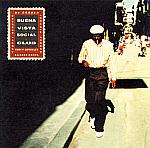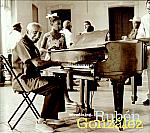

The best way to describe Ry Cooder is that he is the musical equivalent of a cross between Robert de Niro and Zelig. Like De Niro, he has the ability to funnel his extrordinary ability into a simple but deep evocation of any role he gets to play. Like the famous Woody Allen character Zelig, he seems to be able to adopt and merge with the style of whichever musician he is accompanying. Cooder's albums have moved from his early basic slide-guitar material to the excellent 'Jazz' album and on to the sparse but haunting soundtracks for such films as 'Paris, Texas' and 'The Border'. Recently he has been indulging his appetite for world music with a variety of styles from Hawaiian, Tex-Mex and gospel to his duet work with the Indian maestro VM Bhatt on 'Meeting By The River' and, of course, the wonderful African blues album 'Talking Timbuktu' with Ali Farke Toure.
In 1996, Cooder was approached by Nick Gold, the head of the World Cicuit label, to go to Cuba and work with some of the musicians on the "Isle of Castro". Cooder had retained a great interest in the Cuban "Son" tradition that dated back to the 19th century and which had only been heard on a handful of obscure recordings. The unique "Son" sound evolved from a combination of stringed instruments, Spanish-influenced poetry and African rhythms. This musical expedition turned into a reunion for a number of the elder statesmen of Cuban music who used to have musical get-togethers in an informal music club in Havana called the Buena Vista Social Club. There was the '50s vocalist Ibrahim Ferrer; the only woman on the album, Omara Portuondo, whom Cooder dubbed "The Edith Piaf of Cuba"; bassist Orlando "Cachaito" Lopez; trumpeter Manuel "Gaujiro" Mirabal; and the "president" of the club, the legendary 89-year-old guitarist and vocalist Company Segundo, who quickly became the artistic fulcrum of the album.
Later, this elite group of musicians was joined by the pianist Ruben Gonzalez, who had an album released by World Circuit at the same time. Gonzalez hadn't played for years but soon got into the swing of the project, causing Cooder to dub him both "the Earl Hines of Cuban Piano" and "the greatest piano soloist I have ever heard in my life. He's a Cuban cross between Thelonius Monk and Fritz the Cat."
Cooder himself did his usual Zelig act, weaving his subtle guitar work into the fabric of the album without hogging the spotlight. The opening track 'Chan Chan', which is a recent Segundo gem, contains a few well-placed guitar brush-strokes from Cooder that turn this piece into more than just an appetiser for the rest of the album. He also contributed a solo to 'Orgullecida' but for the most part just stuck to his producer/facilitator role and let the "Cocoon club" relive their youth through some inspired and heartfelt collaborations. Overall, the album sounds like music from the Cuban scenes in 'The Godfather - Part 2' when Michael Corleone heads down to Cuba with the other dons to receive their slices of Hyman Roth's Cuban "cake". The songs cover a wide variety of styles from the city sounds of Cuba to the country sounds of Santiago and encompass a full history of Cuban music from the 1869 song 'La Byamesa' right up to songs from the '90s.
The album by the 77-year-old piano sensation Ruben Gonzalez, ironically titled 'Introducing Ruben Gonzalez', flowed from the enthusiasm and energy that Gonzalez displayed during the 'Buena Vista' sessions. Although suffering from arthritis and not even being in possesion of a piano, Gonzalez was coaxed out of retirement and was soon the first to arrive every day for the recordings. Nick Gold realised that Gonzalez deserved his own showcase and so, 53 years after he first recorded with the great Arsenio Rodriguez, Gonzalez began work on his debut album. He selected the musicians and the classic Cuban songs he wished to record and within two days the album was finished without any overdubs. With an immaculate phrasing, intuitive bonding with his fellow musicians and a sure but imaginative touch, Gonzalez adds his distinctive and imaginative style to tracks like 'Tres Lindas Cubanas', Tumbao', the guaracha of 'Mandinga' and the bolero of 'Como Siento Yo'.
With both these albums, World Circuit, Ry Cooder and local distributors Sheer Sound have allowed the rest of the world to hear and appreciate the wonderful and uplifting music from Cuba that, like their legendary cigars, has for too long been known of but unavailable.
Stephen 'Sugar' Segerman
Previous reviews
others in the REVIEWS
|
